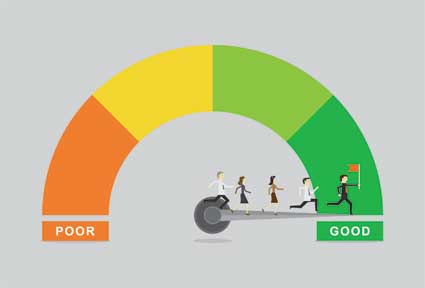When you begin to write SEO for clients, you may find that some people want you to write what you feel is "questionable" copy. It will depend, of course, upon the client, but sometimes the keywords just do not work (or the keyword is actually a phrase that is not grammatically correct, such as "Good BBQ Miami," but it cannot be modified as it is the client's "keyword" and, if modified, would no longer meet your client's specifications) -- or they ask you to really stuff the piece with the keywords (known, quite rightly, as "keyword stuffing").
It does happen. It may not happen to you, but if it does, know that this is part of what is considered "Black Hat SEO." The best thing to do in that situation is simply refuse the assignment.
Think of White Hat SEO and Black Hat SEO like the characters from an old Western movie (as this is where the terms actually come from). The guy in the white hat is the good guy, and the guy in the black hat is the bad guy.
We want to only practice White Hat SEO.
White Hat SEO follows the rules. Black Hat SEO tries to find ways around them, and can actually earn you (or the client) a penalty.
White Hat SEO
By definition, White Hat SEO is the body of approved SEO tactics which have been designed to help increase a website's position on a SERP (search engine result page).
When these search engine results show up by way of the correct methods, which are the organic keywords we discussed in the last lesson, rather than by trickery, this is White Hat SEO.
The best ways to practice White Hat SEO to improve your website's placement, or your client's website placement, is to:
-
Include the important keywords in your title and URL.
-
Use the keywords sufficiently throughout the text, and do so only organically.
-
Add links that include the keywords that are designed to draw your readers farther into the main website.
According to Chitika, an online advertising network, the top organic search result receives about 33 percent of all search traffic. After that, for any results that appear lower on the page, the traffic numbers decline sharply.1
Black Hat SEO
Black Hat SEO tactics include exploitative and/or deceptive methods that are used to try to improve a site's SERP.
However, while Black Hat SEO practices might, for a while, get your webpage to the top, these practices violate search engine terms of service, and will usually result in fines or other penalties.
While the term "Black Hat" still refers to these types of undesirable practices, today, when you hear the term, it often refers to a group of computer users, such as hackers -- those who create computer viruses, and anyone who does something unethical with computers.
If you are learning SEO to promote your own site, remember that using Black Hat SEO practices can get your site completely banned from search engines -- ALL search engines. If you are writing for a client, you may want to drop them a note that you feel the content that they have asked you to write may violate search engine protocol. What they reply is, of course, up to them, and whether or not you continue with the order is up to you. You do not want to get a reputation for writing Black Hat content, though.
When your website is banned from search engines, you have pretty much killed any chance you had of finding new business.
Black Hat SEO Tactics
Black Hat SEO practices are against a search engine's terms of service. Using them may result in a site being banned from a search engine and all of its affiliate sites.
If you check the Google Webmaster Guidelines2 (https://support.google.com/webmasters/?hl=en#topic=3309469), you will find the list of tactics and strategies Google has openly denounced. Bing has a similar set of guidelines (http://www.bing.com/webmaster/help/webmaster-guidelines-30fba23a).3
The best way to ensure what you are writing is not Black Hat is to check their guidelines, or ask yourself if the practice is going to add value for the reader, rather than the site. If the answer is no, and no value is added for the reader, but you feel the practice will help to increase the rankings anyway, then the practice is most likely a Black Hat SEO practice.
When in doubt, don't.
We have discussed keyword stuffing, and non-organic keywords, but there are also Black Hat practices such as:
-
Creating automated content
-
Creating hidden links or redirects
-
Article spinning (which lots of clients actually will ask for)
-
Adding spam links, malware, viruses, etc. into the content
-
Creating duplicate pages
Example of a White Hat SEO piece (After you read the article, we will discuss why this is White Hat, and how it works well for SEO):
How to get a dog to stop barking at night.
There is nothing worse than having to listen a dog barking all night, keeping you from getting to sleep, especially if it's yours. You know that if you can hear it, others can, too, and that barking is keeping them awake, too. There are, however, some things you can do to combat your dog's barking, and keep him quiet all night long.
Know what causes the barking.
First, you must figure out the cause of his or her barking. Is she lonely? Perhaps bored? Or even frustrated or frightened? If you have just moved, he might be unfamiliar with his new surroundings, even a bit afraid of what is outside now.
Or, if you go to bed early, perhaps because you get up early for work, your dog simply may not be tired yet, and he finds himself bored when you are sleeping.
If he or she is frustrated, the dog may be trying to tell you something. Does your dog need out? Is he sleeping in a crate and just does not want to be in it?
The key to stopping the barking at night is to determine the root cause of it.
|
Retrain your dog. The best way to combat barking is to retrain your dog. It will take time, but it will work. One thing that you should do when you dog barks is to give him or her positive reinforcement, not negative. Getting loud and yelling at your dog to stop barking is like barking right back at him, and this only eggs him on. Talk lowly, and slowly. Calm him with your voice. Tell him that he is a good dog for alerting you about something he feels is wrong, because you do want him to do that if something is wrong! Perhaps redirect him with a toy each time he barks at night. Or, take him into your bedroom and allow him to be with you. This may end the barking right away. Until then
Until you have retrained your dog, and stifled those night barking habits, make sure to confine him or her to a place where he cannot be heard as loudly by neighbors. Perhaps put him in a room that is more insulated from the outside, either without windows or where you can close the drapes. This will go a long way to help muffle the noise for anyone living nearby. In addition, by confining your dog to a room at the back of the house, and away from the street, you will not only keep his barking farther away from neighbors, but you may keep him from hearing disturbances outside, which may end the barking on its own. Another idea is to play music for your dog. Something soothing and low may calm him, and it also may help to mask any barking noises, and may help you, and your neighbors, sleep better. Note whether or not your phone or doorbell set the dog off. If so, turn your ringer off at night, and see if your doorbell has a switch that turns it to silent for nighttime.
On command
As stated before, you do want your dog to bark when something happens, such as seeing a suspicious person around the house. Try to use a command that tells him or her to stop barking (perhaps even using the word "stop"); this should be done in a firm voice, but do not yell. Each time your dog barks, let him bark a few times and then praise him for sounding the alarm. After that praise, say, "Stop," in your firm voice and give him a treat. This positive reinforcement lets him know that barking is okay, until he is told otherwise. If he sees the treat, he will typically stop barking, because he cannot eat and bark at the same time. After he stops barking, praise him, and give him the treat. While he is eating his treat, continue to praise him, telling him, "Good dog," and, "Good quiet." Tell him, "Stop," then wait a few seconds. If he does not bark again, he gets praise and a treat. It will take a few sessions, but he will get it. Also note that dogs get tired quickly in training sessions, so do not work for more than a minute or two at a time.
Entertainment
If your dog is simply bored at night, find some interactive toys that he or she can play with safely while you sleep. There are many out there, and some even have treat incentives inside that you dog has to figure out how to get. If his brain is busy, he won't be barking. Try these simple tips and you, and your neighbors, will be sleeping through the night in no time! |
Why this article works:
The reason that this piece works is that it draws anyone who is searching for "dog barking at night" or "stop dog barking" right to this piece. The client's SEO instructions were to utilize the keyword phrase "dog barking" 2 percent to 2.5 percent, which was done here.
The secondary keywords were "night" and "stop barking," which he wanted used at 1 percent. Ideally, the client can use this piece on his dog training blog and draw in some new clients, while also promoting a product that can help stop a dog's barking, such as training DVDs, Thundershirts, or even training treats for positive reinforcement.
He could put links to any of these items within the blog, taking the reader to another site where the items are sold.
Why is this White Hat? Because the keywords are added organically, they are not forced. The keywords are used at the percentage the client specified, and not more, so there is no keyword stuffing. The sentences make sense as you read them, there is no awkward phrasing to get them into the piece.
Now, it will be your turn to write a White Hat SEO article.
1) http://chitika.com/
2) https://support.google.com/webmasters/?hl=en#topic=3309469
When you take on an assignment -- an SEO copywriting assignment -- not only will your client provide keywords, but he or she will also provide you with a keyword density percentage. This percentage is simply the number of times the keywords should show up in proportion to the overall number of words in the article.
The Importance of Keyword Density
Keywords are actually the most important part of SEO (when it comes to matching searches), so it just makes sense that the client will want them in the piece a specific number of times. After all, they are paying you to help them increase their SEO rankings, so they want this done right -- and that means you need to know how to do it correctly.
The term "keyword density" is used often when we discuss SEO; it is a vital component of every SEO article. When the term was coined, it led many writers, and non-writers (i.e. clients), to believe that the more times their keywords were included, the higher their web page would be ranked during any type of search. This is how the entire SEO industry came to be. However, it is not always true.
Just because you use a keyword or phrase a lot, does not mean it will show up higher in a Google search. In fact, Google looks not just at the number of times that keyword comes up, but also how many times it is used in combination with other relevant keywords or phrases.
Generally, web searchers do not search simply for one word (think of how many results you would get!) but for a combination of words. Google (or any search engine for that matter) looks for these combinations when it returns your search results. So, it is important to have more than one keyword per article, as well as keyphrases.
A keyphrase is a string of several words that the client wants placed in the article, in the exact order that it is written, with no other connecting words. For example, 'Houses Beverly Hills'. The client wants a sentence (or three) that contains that phrase, but not, say, "Houses for sale in Beverly Hills.'
How to Determine Keyword Density
Determining keyword density is not tricky, but it does require math (not every writer's favorite subject). The good news is that there are programs that will determine the keyword density for you. There are plenty of free keyword density checkers, tools and calculators available on the web. One of my favorites is http://kesor.net/keyword-density/ because it is simple and easy to use. (Oh, and it is free to use!)2
Benefits of Protein Supplements
The benefits of taking a protein supplement are numerous. For those who want to gain muscle mass, they are essential. For anyone looking to get leaner while losing body fat, they are a great tool. Protein supplements assist in muscle growth, so no matter your goal -- less body fat, a leaner look, bulkier muscles, or simply added strength, a protein supplement can be your best friend.
For those who are looking to add muscle mass to their frames, or strength to their bodies, it can sometimes be difficult to take in enough protein from simple meals and snacks. This is where the protein supplement comes in handy. Adding protein supplements to your current dietary regimen is simple. Most supplements come in powder form and can be added to milk or other beverages. After that, you can easily sip your protein. Or, use them as a shake in the morning at breakfast, between meals as a snack, or as a pre- or post-workout meal. The amount of protein that each shake provides will differ from brand to brand, so read your labels.
Exercisers who are looking to get lean or lose body fat will also benefit from adding a protein supplement to their diets. Muscle takes up less room in the body than fat does, and muscle burns more calories than fat, even at rest. Getting rid of fat means adding more muscle; if you exercise and don't add protein, you are simply spinning your wheels, getting nowhere. You must add protein to get lean! If you aren't getting enough from your meals, an added protein supplement will do wonders for your workout program and you'll start to see results right away.
How Much Protein Do I Need?
Typically, the amount of protein a person needs depends upon their goals and their body weight. Most nutritionists and personal trainers agree that you should consume 1.2 to 1.7 grams of protein per day for each kilogram of body weight that you have. It may sound like a lot, but this is what is necessary to build the needed muscle on your frame, to get you the body that you want.
So, you can see just how important protein supplementation is. It is very difficult to ingest that much protein, even if you are eating big meals and eating pure protein -- things like boneless, skinless chicken breasts, eggs, and the like. Adding a protein supplement will help get you to your goals.
How to Choose the Right Protein
Everyone is different, and protein supplements differ, too. You might choose a supplement by flavor, by customer reviews and ratings, by how much protein is offered by serving, by ingredients, by type of protein (whey, soy, etc.), or even by how the supplement is ingested. (Does it have to be taken with milk? Perhaps it is a supplement that is added to fruit juice?)
One thing that you must do is read packaging labels. Make sure that the ingredients are high quality and that the protein source is right for you. For example, vegans will not want to take a whey protein supplement.
User reviews and ratings are always a good place to start, as are reviews done by professionals. Sometimes nutritionists, doctors, or other healthcare providers will weigh in with their opinions. However, remember these are all simply opinions, so choose the one that you will use consistently. If a reviewer rates a grape-flavored supplement high, but you hate the taste, you won't use it. Choose a type of protein supplement that you will enjoy sipping every day. It does you no good if it sits in your cabinet, unused.
To check my keyword density, you would simply cut and paste the article3 into the space and watch the numbers at the bottom.
When using my protein supplements piece, you will see that the tool at the bottom ranks all the repeated words and phrases. In my case, the client wanted 'protein supplement' to be used at a rate of 2.5% and 'protein supplements' to be used at a rate of 1.25% (I was a bit off on that one, but they let it slide). You need not be concerned, when the piece is your own, about the numbers next to other words --just your keywords.
The above client wanted an article written for those in the market to buy a new protein supplement, or for those in the market to compare different protein supplements. They also wanted to touch on why protein is necessary and what it does for the body.
In the case of this SEO piece, it works when people are searching for "protein supplements" or even "best protein supplement," or "protein supplements for body fat loss."
In this assignment, you will be utilizing either the keyword density tool that we have just used, or another of your choice.
Typically, a client will ask that your main keyword be at or around 2.5 percent. This may be higher for longer pieces, but for articles around 500 words, expect to be asked for a main keyword density of 2.5 percent. The additional (sometimes called "secondary") keywords will show up fewer times, at around 1.5 percent. This is just typical, this is not set in stone. Every client, every website, every piece, is different.
The important thing to remember is that this is all formulaic. It's math. If the client wants 2.5 percent, you need to make sure it is 2.5 percent (unless it comes up at around that number and the client says that is fine. Often if it they want 2.5 percent and it comes up at 2.25 or 2.6 percent, the client will allow that, but make sure to check with them before submitting copy.), because the client will check.
Keyword Density Reminders
What the math boils down to is this: If the client wants 2 percent density of the main keyword, this means that it should appear two times per 100 words.
The client has already run the numbers and he or she knows what keyword density he is looking for. If he asks you for 2.5 percent and you give him 1 percent, you can bet that the copy is coming back to you for a rewrite.
Know your numbers, and utilize a tool that you like and trust.
1) http://www.webconfs.com/seo-tutorial/seo-and-keywords.php
2) http://kesor.net/keyword-density/
3) http://bestproteinsupplements.co.nz/























